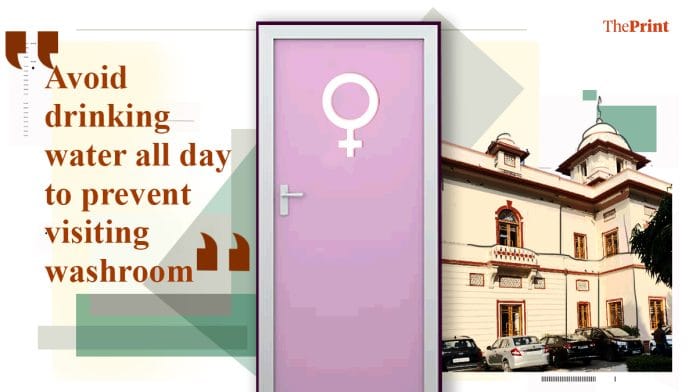New Delhi: The Supreme Court Wednesday called for immediate steps to ensure all judicial premises are equipped with accessible toilet facilities for judges, litigants, advocates and staff as it highlighted the “sorry state of affairs” in court facilities.
A two-judge bench comprising Justices J.B. Pardiwala and R. Mahadevan issued the ruling in response to a 2023 plea by an advocate from Assam, Rajeeb Kalita, seeking directions to all states and Union Territories (UTs) to ensure basic toilet facilities across courts and tribunals. The court issued 15 directives, including allocating sufficient funds for constructing and maintaining such toilets, ensuring the presence of stocked sanitary napkin dispensers and creating grievance redressal mechanisms to lodge complaints.
Expressing concern over the condition of toilets in district courts in its 34-page ruling, the court noted instances “where even judges, particularly in rural areas, still lack access to proper washroom facilities”. “Failure to provide adequate washroom facilities is not just a logistical issue, but it reflects a deeper flaw in the justice system,” the court said.
This is not the first time a court has taken cognizance of this problem plaguing courts and tribunals across the country, particularly at the district level.
On 5 December, 2024, the Delhi High Court directed authorities to ensure uniform hygiene standards and functionality in women’s washrooms across the city’s district courts, saying their current conditions demanded “urgent attention”.
“The negligence displayed in maintaining these facilities cannot be overlooked. The lack of hygiene products, poor maintenance, and infrastructural inadequacies demand immediate action,” Justice Sanjeev Narula ruled. His ruling was in response to a plea filed by advocate Smita Kumari Rajgarhia, who raised concerns about the unhygienic condition of women’s washrooms at the Saket Court Complex. Flagging the issue as one that “directly impacts the dignity, safety, and well-being of women who frequent the district courts”, the court in October last year, appointed advocate Harshita Nathrani as Court Commissioner to conduct a comprehensive assessment of women’s washrooms across all district courts in Delhi.
Her 244-page report, submitted before the court on 4 December, revealed widespread deficiencies, which the court said painted “a distressing picture”.
“The report lays bare deficiencies demanding urgent attention. The findings reveal that most female washrooms in the Lawyers’ Chambers Blocks lack adequate infrastructure, including proper lighting, ventilation and functional sanitary facilities.”
The report also flagged issues such as seepage, exposed wiring and the absence of essential amenities such as soap and sanitary napkin vending machines.
It further noted that regular maintenance and cleaning were absent due to insufficient sanitation staff, posing serious hygiene and safety risks to users.
Delhi-based lawyer Aatrayi Das, who frequently practises at the Saket Court Complex, told ThePrint women lawyers tried to avoid using district court washrooms as much as possible.
“A lot of us avoid drinking water for long periods to reduce the need to visit washrooms, which is extremely dangerous and unhealthy in itself and leads to serious problems like dehydration, UTIs and kidney issues,” she told ThePrint. Das recalled the example of a colleague who contracted a Urinary Tract Infection (UTI) after using a court washroom.
“This is an issue that affects women of all ages. For instance, one of my colleagues contracted chronic UTI, after coming into contact with a persistent strain,” Das said.
“Even personally as a lawyer practising in Delhi, I can say while I am stress-free at the Delhi HC, I cannot say the same for Karkardooma or Dwarka district courts, both of which are quite far from my office.”
ThePrint inspected women’s washrooms in five district courts across Delhi—District & Sessions court, Tis Hazari Courts Complex, Patiala House Courts Complex, Rouse Avenue District Courts Complex, Karkardooma Court Complex and Saket Court Complex—and found multiple hygiene issues and safety hazards ranging from lack of basic facilities such as soap and sanitary napkin vending machines to water shortages and unsafe wiring.
Karkardooma: No basics, water shortage
When ThePrint visited, it found that conditions at the new facilities at the District Court Karkardooma were dire. Although the Public Works Department (PWD) awarded a tender in August 2023 to renovate 64 washrooms in the Lawyers’ Chambers Blocks D, E, F and G, the inspection revealed that the new lawyers’ building lacks even the most basic amenities.
The building was inaugurated in May 2022 by former Delhi chief minister Arvind Kejriwal and former Supreme Court judge Justice (Retd) Sanjay Kishan Kaul.
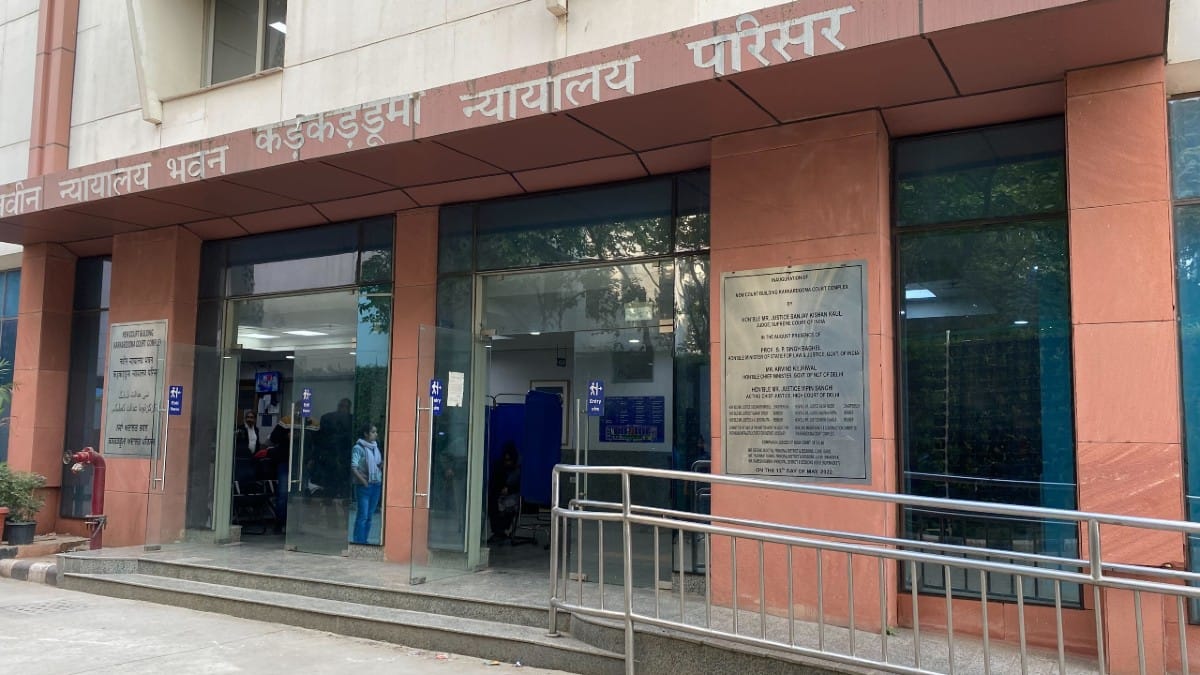
Essential items like functional flushes, hand wash, soap dispensers, toilet paper, tissues, hand driers and sanitary napkin dispensers were absent, with jet sprays often non-functional.
The court noted that despite a daily footfall of approximately 50,000 people, the number of sanitation workers was woefully inadequate to maintain acceptable hygiene standards.
Water shortage was a major issue that extended beyond the court’s washrooms to the new lawyers’ building and courtrooms. Women lawyers who frequently practise here said they had complained about this problem several times but no action had been taken.
“The state of washrooms here can vary significantly depending on the area. Generally, there is a lack of hygiene and issues of irregular maintenance, water supply and poor infrastructure continue to crop up. Some even lack basics like soap, toilet paper or even functional locks,” said advocate Mohini Jha, who practises at Karkardooma court.
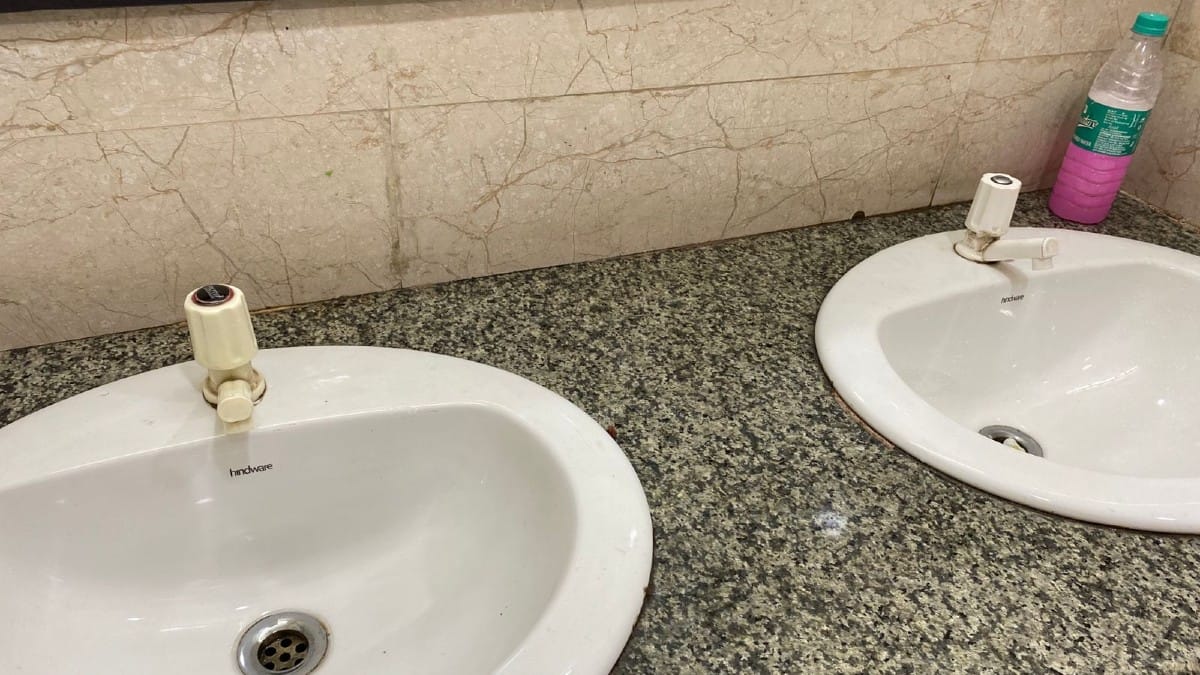
Jha said although the lawyers’ block washrooms are considered marginally better than those in public areas as they cater specifically to lawyers, issues such as overcrowding, limited cleaning, inadequate ventilation and unpleasant odours have persisted for a while.
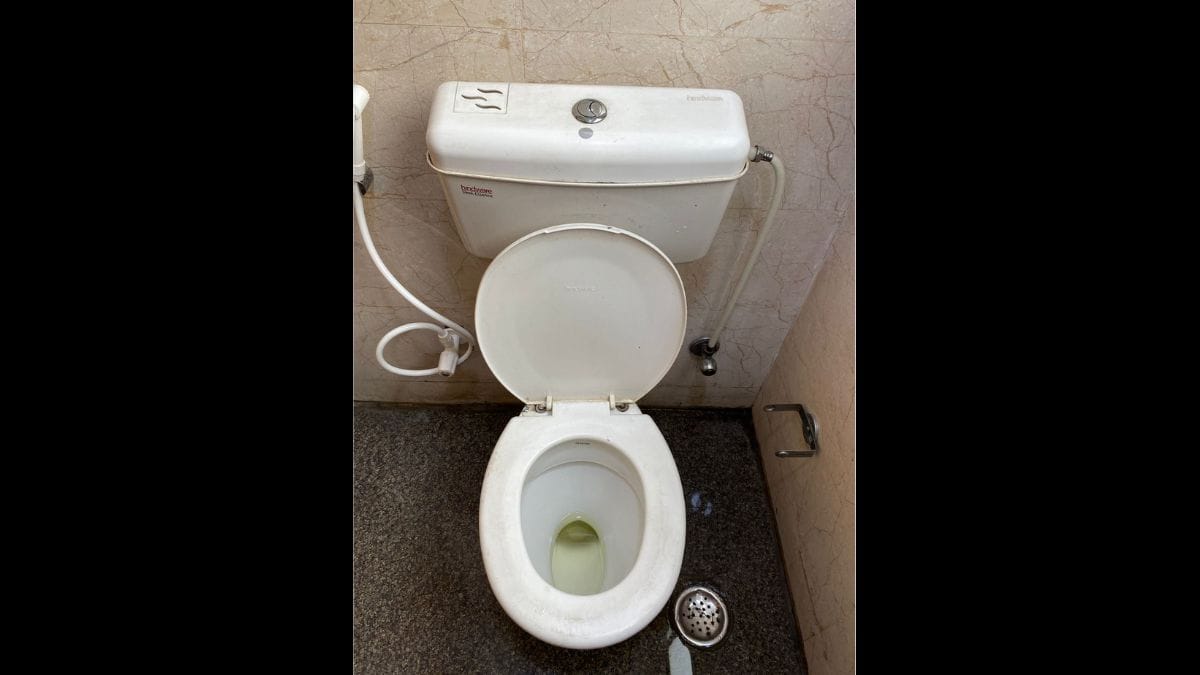
She recommended appointing dedicated cleaning staff with strict schedules and upgrading the infrastructure to include modern fixtures, proper drainage and better ventilation.
Installing soap dispensers, hand driers and ensuring an uninterrupted water supply could help, she said. She also suggested raising awareness among litigants and lawyers to promote cleanliness and emphasised the importance of regular inspections.
Another advocate, Neha Singh, echoed the same sentiment. “While major changes are needed in the lawyers’ block, there aren’t any dustbins in the general washrooms, which also require urgent cleaning.”
Saket: Erratic water supply, faulty flush
The state of women’s washrooms at the Saket Courts Complex is no better, lawyers told the Print. One of the biggest issues there was erratic water supply.
When ThePrint visited, it noted that the water supply to the Lawyers’ Chambers Block was cut off after 3-4 pm, restricting the use of the washrooms. Moreover, the washroom door in the lawyers’ block was jammed and a malfunctioning flush continued to run once pressed.
The court noted that the PWD had taken “some corrective measures” and issued a tender for the renovation of all common toilets in the Lawyers’ Chambers Block. However, it also emphasised the report’s finding that condition of washrooms within the court complex and those in the lawyers’ blocks differed significantly, with the latter being in a “worse state”.
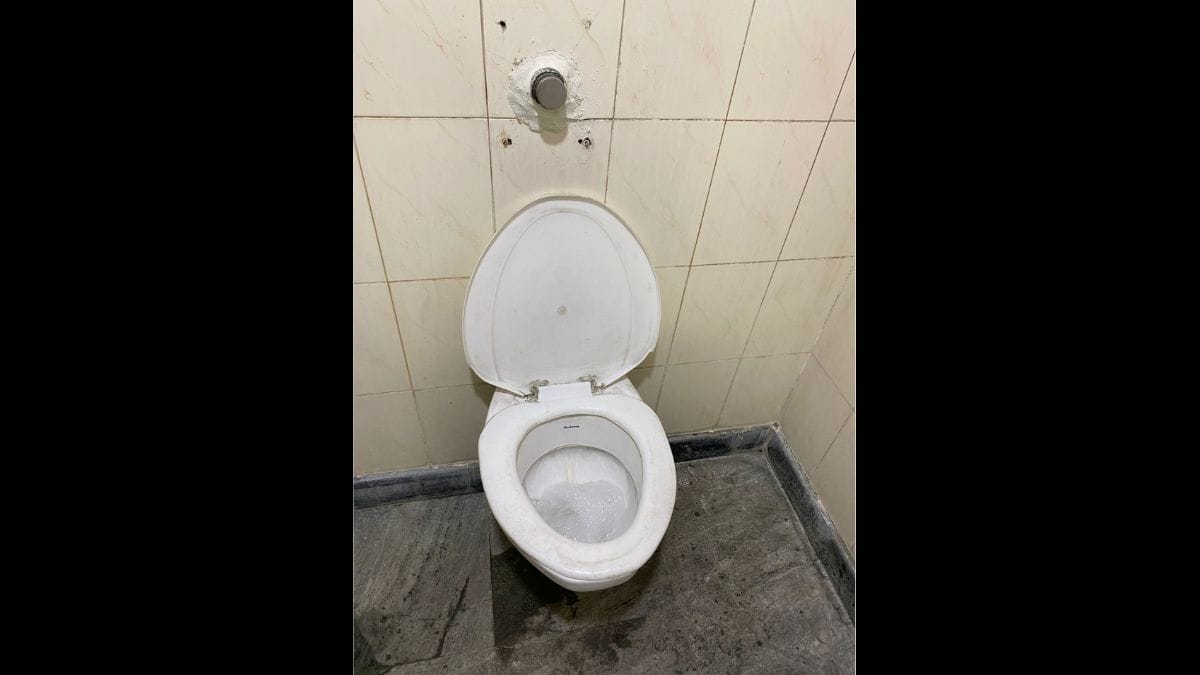
“If you go to the lawyers’ block or the old building, you’ll see they very much have the infrastructure, but their maintenance is terrible. It’s an honest fact,” said Aatrayi Das.
She said few washrooms had sanitary napkins, hand wash, hooks for hanging things or even clean hygienic spaces for keeping files. “Most of the time, we have to leave our things in the courtrooms,” she said. “You don’t need a fancy marbled seat to call it a washroom but basics are important.” According to Das, maintenance is a big problem.
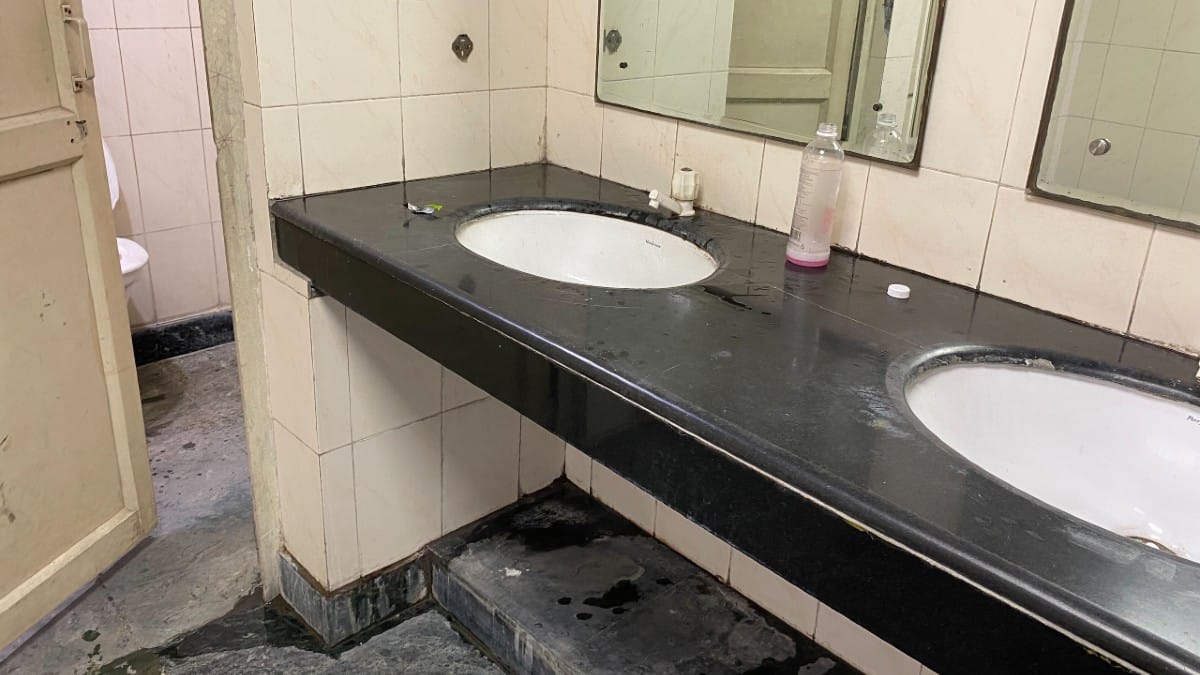
Although the two new buildings have better infrastructure, they remain poorly maintained, with issues such as no water in flushes and taps as well as a lack of proper dustbins.
“More than lawyers, litigants face it. A lot of lawyers still have their chambers nearby. However, I had the worst experience at the Mediation Centre at the Saket court. I walked to the other block and even there, it wasn’t much better. I felt really icky that day.”
Das suggested that bar associations implement rules and regulations to address the issues. “A little supervision and accountability go a long way. Oftentimes in the Supreme Court and Delhi High Court washrooms, I have noticed the staff is strict even with senior lawyers,” she said. “Besides this, regular inspections and checks act as improvement mechanisms.”
She added that while such administrative responsibilities generally fall under the purview of bar associations, they aren’t given enough attention at the district courts.
Also Read: How Supreme Court’s process of designating senior advocates changed in last 7 yrs & what it is now
Patiala House: Not enough supplies, irregular cleaning
The washrooms at the Patiala House Court seem better than those in many other courts, but they too lack basic amenities.
Built in 1938, the Patiala House district court houses a mediation centre, a lock-up facility, the Delhi Legal Services Authorities Office, and lawyers’ chambers, in addition to a range of civil and criminal courtrooms. At first glance, they appeared clean and well-equipped with a woman attendant, hand dryers and a steady supply of water and soap.
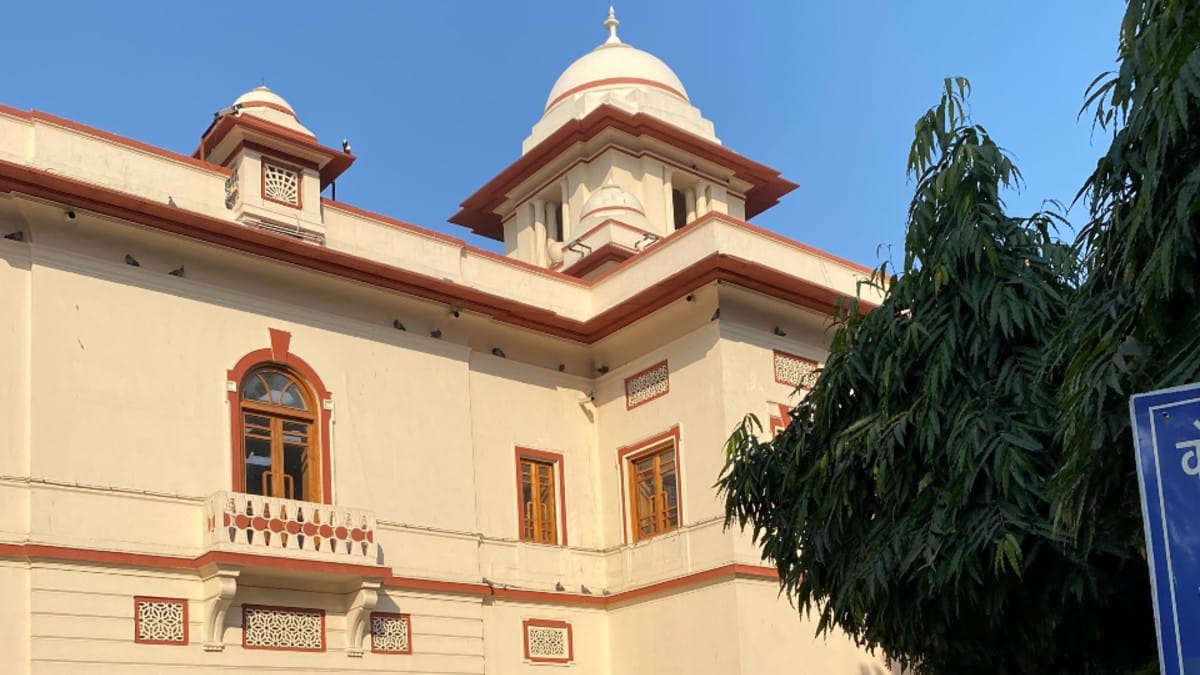
But a close look inside the cubicles revealed significant room for improvement. They had no hooks or designated spaces for women to keep their bags or files. Moreover, stalls and seats were wet with black grime marks, raising concerns about the risk of contracting a urinary tract infection (UTI).
The court commissioner’s report following its November inspection of all four women’s washrooms at Patiala House found the walls and ceilings in a “deplorable” state with signs of significant deterioration. “The overall cleanliness of the washroom was subpar, which, in turn, poses a significant health hazard to the public, as it compromises the sanitation and safety standards expected in such facilities,” the report said.
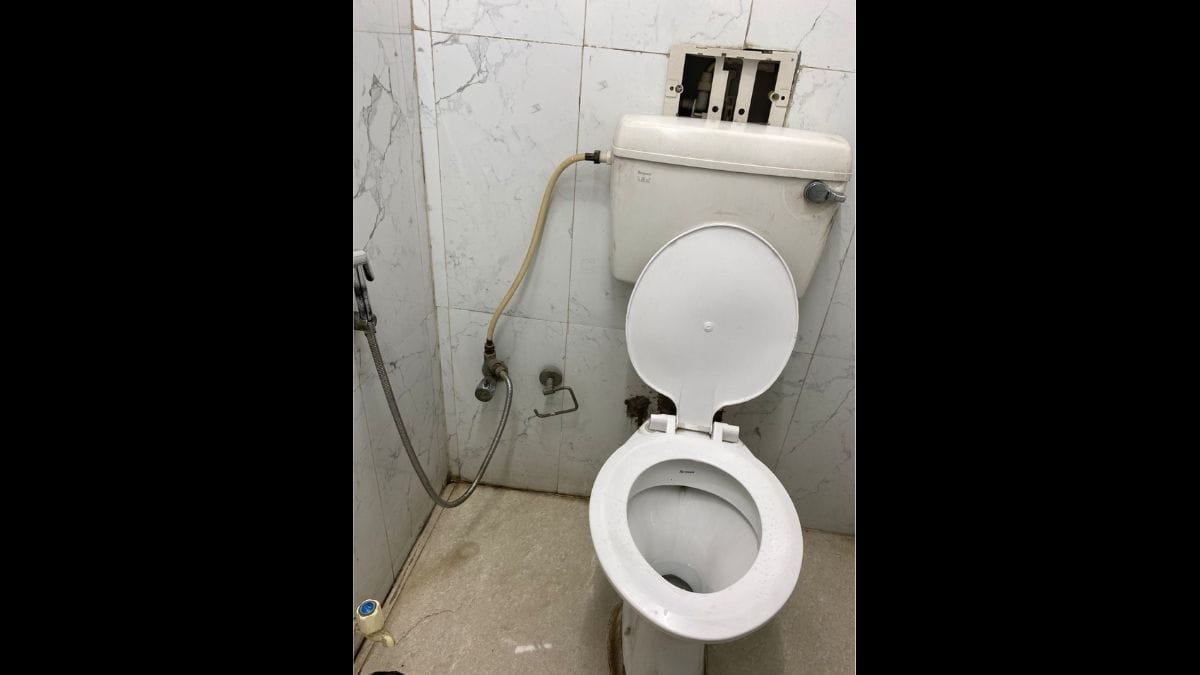
The washrooms were found to be severely lacking in essential hygiene products, including soap and other basic sanitary amenities, it also mentioned. The report noted that the only washroom that met basic hygiene standards was the one in the women’s bar room.
Delhi-based lawyer Khushi Mogha acknowledged that although the current state of washrooms at Patiala House is far from ideal, the high court’s directions are expected to address these concerns. She also highlighted the issues of irregular maintenance stemming from the shortage of cleaning staff. Going forward, she said that raising the issue with a local bar association could be an effective way to drive change.
Tis Hazari: Waiting line, no cleaning staff
The Tis Hazari court fared relatively better than the others. When ThePrint visited, it found that though women’s washrooms at Tis Hazari were packed with litigants and lawyers, the staff was diligent and constantly monitored the facilities to maintain cleanliness levels.
They also hung feedback forms near bathroom stalls for users to raise any complaints.
On the whole, the bathrooms were reasonably clean and equipped with hooks and soap dispensers. Lawyers say conditions only improved after the court-appointed commissioner’s visit in November 2024 found several issues related to maintenance and supply shortages. “In the Lawyers’ Chambers Block, it has been observed that the overall condition of the washrooms was very poor and despicable,” the commissioner’s report said.
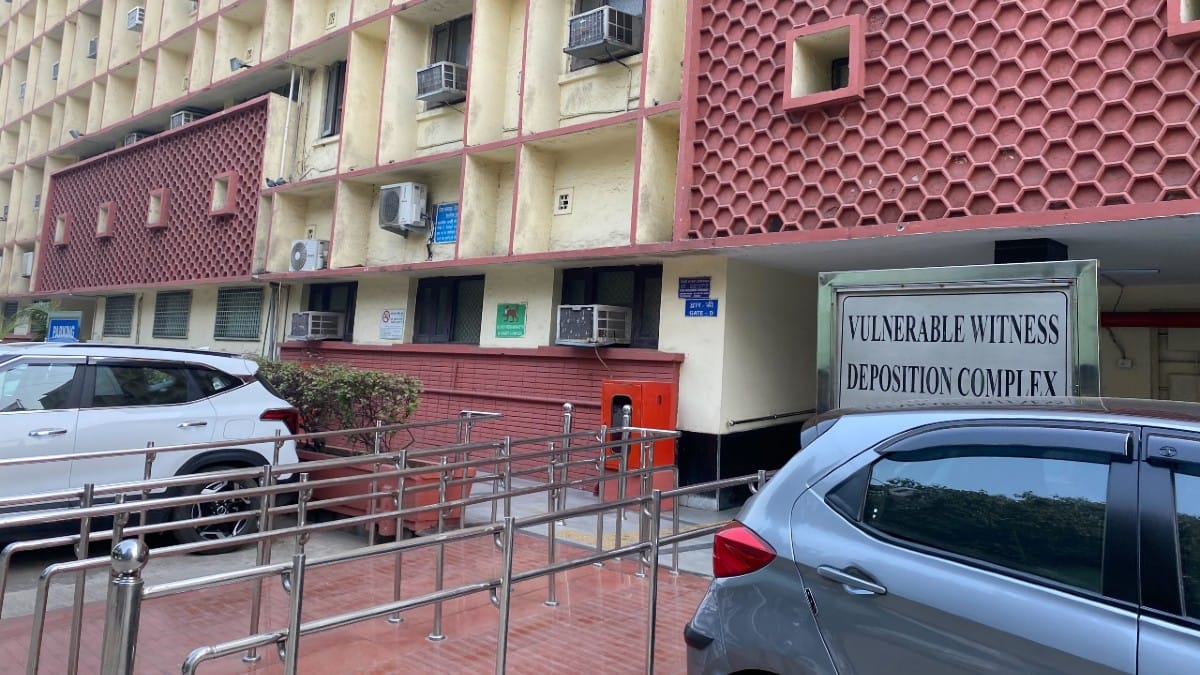
But Delhi-based lawyer Shruti Mishra said cleanliness and hygiene were limited to one of the buildings, Annexure III, and the court was plagued by other issues such as insufficient bathroom stalls. “Although there are men’s and women’s washrooms on each floor in the central building, if someone is inside the stall, there is inevitably a waiting line outside.”
“Another issue is that these waiting lines are usually longer than two persons, which in turn leads to a very packed washroom,” she said.
The commissioner’s report said the washrooms lacked basic amenities such as soap, lights and exhaust fans. It also noted heavy seepage and overflow problems, exhibiting “clear neglect” and lack of maintenance of basic hygiene and sanitation standards. “In the civil wing, there was a foul smell emanating from the washrooms and there were no lights, soap or any cleaning staff/attendant,” the report said.
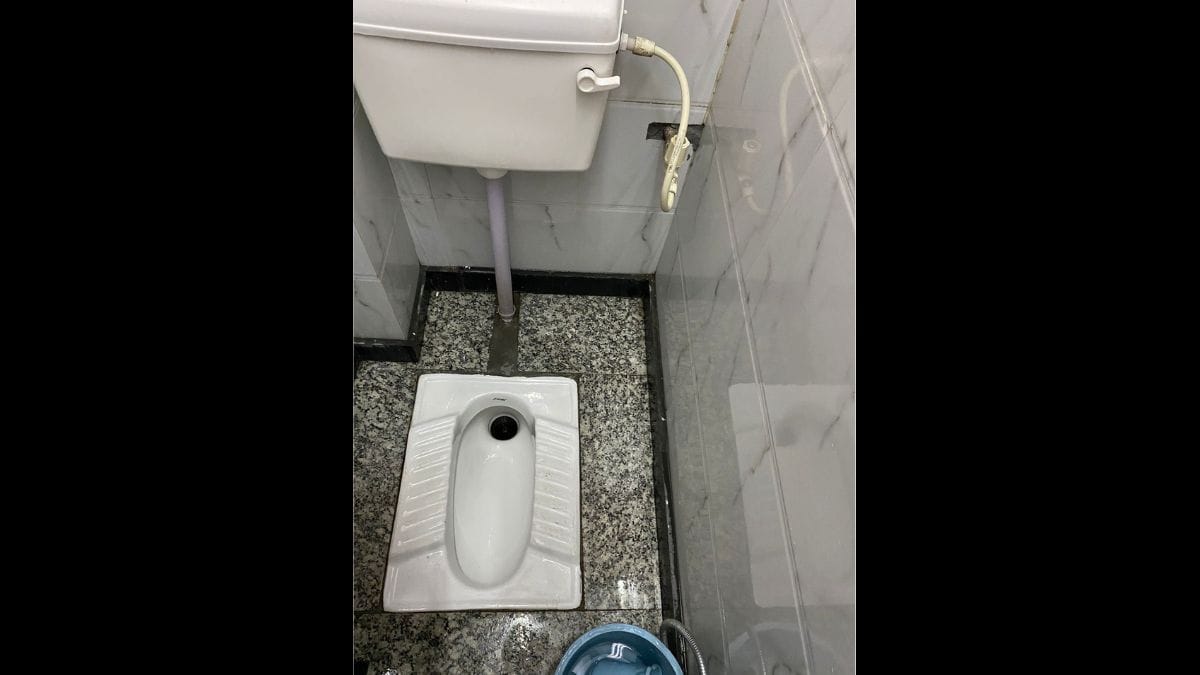
It added that housekeeping staff had informed them that washrooms were cleaned only three days a week, and cleaning supplies like floor cleaners were only given once a month.
Finally, the report highlighted the stark contrast between the washrooms inside the court and those in the lawyers’ chamber blocks, with the latter in a “deplorable” state and the former exceeding expectations.
Also Read: ‘Tareekh pe tareekh’ is not it. Here’s why India’s district courts are staring at massive pendency
Rouse Avenue: Mixed picture
The newly-constructed Rouse Avenue District Court Complex known for hearing cases involving MPs, MLAs and other politicians presented a mixed picture.
Inaugurated in April 2019, the court complex also has a homeopathic and Ayurvedic dispensary as well as a Cafe Coffee Day on its premises. When it was established, the Delhi High Court released a notification stating that all special judge courts, CBI courts, labour courts and the anti-corruption branch would function from Rouse Avenue.
The court commissioner’s inspection found that while each of the eight floors had two women’s washrooms, only one on each floor was equipped with a sanitary napkin dispensing machine. These machines were found to be non-operational.
“A significant concern noted was that each washroom is fitted with two basins: one with a manual tap and the other with a sensor-operated tap,” the report said. “Unfortunately, on every floor, the sensor-operated tap in the basins was not functioning, which posed a challenge in terms of cleaning and maintaining sanitation effectively,” it added.
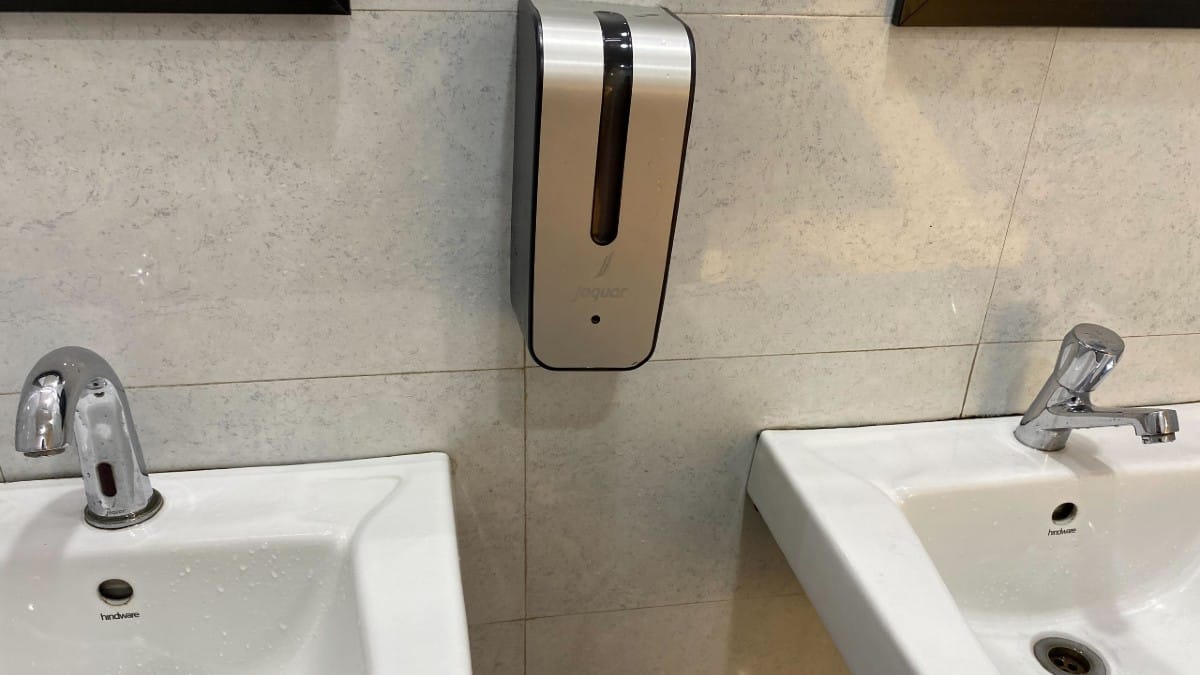
However, when ThePrint visited, it found the sensor taps were working while the sanitary napkin vending machines were still not functional.
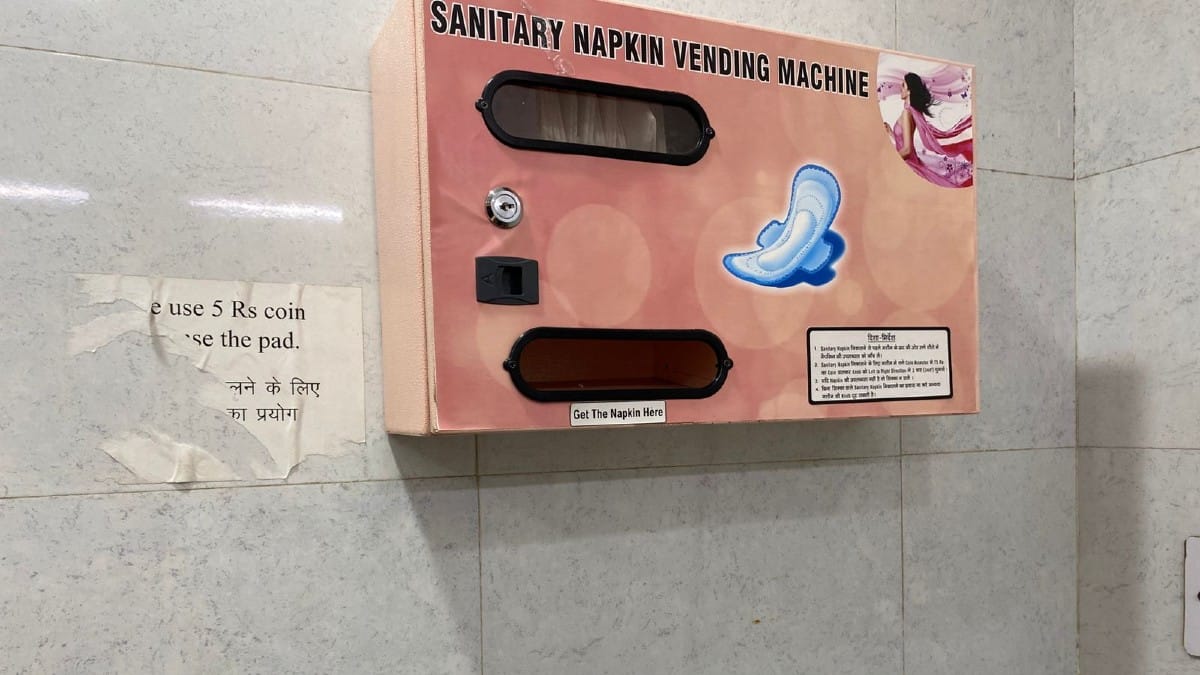
Although the washrooms looked clean from the outside, a closer look revealed the seats were not clean and a foul smell emanated from the bathroom stalls.
Rohini: Safety hazards, foul smell & ‘ghost employees’
The commissioner’s report found many safety hazards at the Rohini district court’s washrooms, including exposed electrical wires, loose and dangling lights and faulty switchboards, which pose significant risks because of the presence of water.
The report also found multiple cracks on the tiles of walls, which “seemed to be on the verge of collapse,” and partially damaged ceilings with visible seepage.
Further, it revealed that the Rohini Court Bar Association’s members had informed the court commissioner that although 18 sanitation employees were assigned to the Lawyers’ Chambers Block, half were “ghost” employees—in other words, they only existed on paper and never showed up for work. “Of those who did report, many left by 4 pm, contributing to the neglect and poor maintenance of the washrooms,” the report said.
“Out of the total washrooms across 15 floors, only three or four were open and functional, while the rest remained locked, limiting accessibility for those in need,” it said. Another “alarming issue” was the state of the washrooms designated for people with disabilities.
It also highlighted a “prominent foul smell” in almost all washrooms due to the absence of exhaust fans and ventilation, though ducts were available for their installation.
Advocate Soumya Dubey, who practices at the Rohini district court, told ThePrint the condition of washrooms was “highly unsatisfactory”, with inadequate cleaning and maintenance leaving the facilities uncomfortable and unhygienic.
She said the washroom in the lawyers’ block was frequently unusable due to water shortages, with the lack of consistent upkeep only adding to the “dismal state”. Underlining how general or courtroom areas are even worse, she said, “They are often in such an appalling condition that even walking near them becomes unbearable.”
Dubey suggested that a systematic approach to regular cleaning, a reliable water supply and assigning staff for daily maintenance could significantly improve the situation. She also said having attendants nearby and holding those responsible accountable could be crucial for improving the facilities.
Dubey confessed she hadn’t lodged any complaints personally, but others had raised grievances in the past. “Temporary improvements are sometimes made during Bar Council elections or power shifts, but these changes are short-lived, and the situation reverts to its earlier state,” she said.
Dwarka: Not operational, risk of electrocution
The November inspection of the Dwarka District Court Complex washrooms revealed a series of significant issues. One of the main problems was that many of the women’s washrooms were inaccessible because they were under construction.
“Of the total eight floors, the female washrooms on three floors were not operational due to ongoing construction,” the commissioner’s report said.
Another critical issue was the lack of water supply to flush systems in most washrooms.
“Upon inquiry, it was conveyed to the undersigned that the water supply problem arose due to a damaged water pipe on the day of the inspection. This disruption had rendered the flush systems non-operational,” the report said.
The washrooms that were operational were only “marginally satisfactory”.
A particularly alarming issue was the state of the electrical fittings. “Loose and broken electric plugs were observed on almost every floor. This poses a serious safety hazard for the public at large and increases the risk of electrocution,” the report said.
Delhi-based lawyer advocate Gurbani Bhatia told ThePrint she mostly avoids going to the washroom in the court premises and prefers to wait until she reaches her office.
“During a recent visit to the Dwarka court in December, I saw the disgusting state of the washroom that no person should be forced to use,” Bhatia said. “These deficiencies like the absence of basic hygiene supplies like soap or toilet paper and irregular water supply have compromised the health and safety of women in court.”
(Edited by Sugita Katyal)
Also Read: Alarming gender disparity in judiciary: 4 women judges out of 33 in SC, 66 out of 627 in HCs



